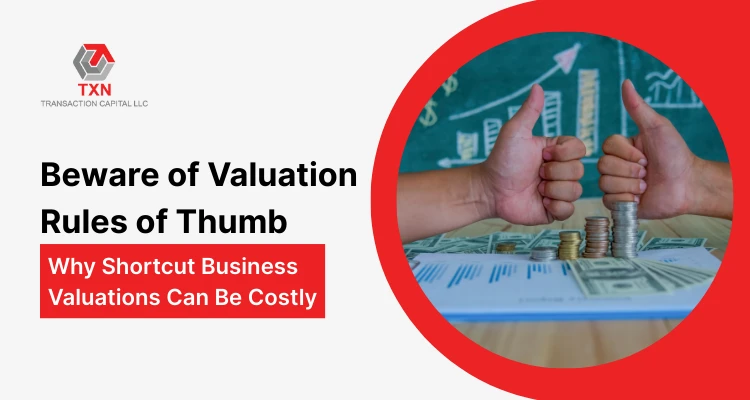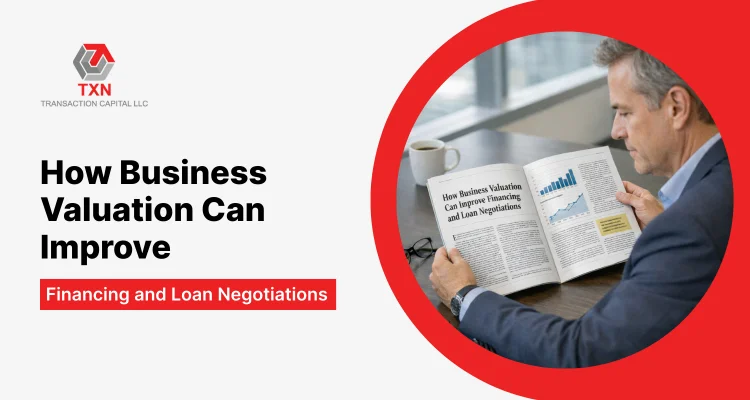Beware of Valuation Rules of Thumb: Why Shortcut Business Valuations Can Be Costly

Using industry shortcuts to value your business is like performing surgery with a butter knife—quick, but potentially catastrophic. Professional business valuation services reveal the true worth that generic formulas lack, protecting you from costly mistakes that could derail your financial future.
If you're considering selling, acquiring, or structuring equity compensation for your company, this comprehensive guide from Transaction Capital LLC will save you from expensive valuation errors that plague countless business owners every year.
What Are Valuation Rules of Thumb?
Valuation rules of thumb are simplified formulas that estimate company value using basic multipliers applied to financial metrics. These quick calculations typically include:
- 2-3x EBITDA for professional service companies
- 40-50% of annual revenue for retail liquor establishments
- 1.5-2x Seller's Discretionary Earnings for small retail operations
- 1.2x Net Income for automotive service businesses
- $100,000 per active subscriber for SaaS platforms
These multipliers originate from outdated transaction data, industry averages, or anecdotal evidence. While they appear useful for rapid estimates, they fail to capture the unique characteristics that differentiate one business from another.
Why Do Valuation Rules of Thumb Create Dangerous Blind Spots?
1. They Completely Ignore Company-Specific Risk Factors
Two identical businesses in revenue and profit can have vastly different risk profiles that rules of thumb cannot detect.
Example: Both Company A and Company B generate $2 million EBITDA. A standard 3x multiple suggests both are worth $6 million. However:
- Company A: 70% revenue concentration from one client, aging equipment, owner-dependent operations
- Company B: Diversified customer base, recurring SaaS revenue, strong management team
2. They Assume Your Business Is "Average" (But Average Rarely Exists)
Rules of thumb assume every company fits the industry average, but this assumption is fundamentally flawed.
The famous 1940s U.S. Air Force study attempted to design an "average" pilot cockpit using 10 physical dimensions. Out of 4,000 pilots studied, zero pilots matched the average across all dimensions.
The same principle applies to businesses: no company is truly average across all valuation factors. Your unique competitive advantages, operational efficiencies, and market positioning deserve individual assessment.
3. They Overlook the Specific Purpose of Your Valuation
Different valuation purposes require different methodologies and compliance standards:
- 409A valuations for equity compensation compliance
- Gift & estate tax valuation services for succession planning
- ESOP valuation services for employee ownership transitions
- Fairness opinions for M&A transactions
- Litigation support for shareholder disputes
Each purpose demands specific methodologies that rules of thumb cannot provide. IRS compliance, SEC reporting, and audit requirements all have unique standards that generic multipliers fail to meet.
4. They Miss Critical Market and Economic Context
Market conditions constantly evolve, but rules of thumb remain static. Economic shifts, regulatory changes, and industry disruptions dramatically impact valuation multiples.
Pre-COVID retail example: Many retail businesses used 1x revenue multiples in 2019. Post-pandemic market realities, including e-commerce competition and changed consumer behavior, reduced many retail multiples to 0.5x revenue or lower.
Professional valuations incorporate current market conditions, recent comparable transactions, and economic forecasts that rules of thumb cannot capture.
5. They Lead to Costly Financial Mistakes
Inaccurate valuations based on rules of thumb create expensive consequences:
- Overpaying for acquisitions by millions due to inflated multiples
- Underpricing equity in funding rounds, resulting in excessive dilution
- IRS penalties for non-compliant 409A valuations using incorrect methods
- Estate tax miscalculations that trigger audits and additional liabilities
- Poor negotiating positions in M&A transactions due to inaccurate baseline values
How Much Can Rules of Thumb Cost You? A Real Comparison
Let's examine two similar companies to demonstrate how rules of thumb fail in practice:
Company Alpha:
- Annual Revenue: $1.5 million
- Seller's Discretionary Earnings: $300,000
- Customer concentration: 80% from two clients
- Technology: Outdated systems requiring replacement
- Operations: Heavily owner-dependent
Company Beta:
- Annual Revenue: $1.2 million
- Seller's Discretionary Earnings: $280,000
- Customer base: Well-diversified across 50+ clients
- Technology: Automated systems with recurring revenue
- Operations: Experienced management team in place
Rules of thumb calculations:
- Revenue multiple (0.6x): Alpha = $900,000, Beta = $720,000
- SDE multiple (2.5x): Alpha = $750,000, Beta = $700,000
Rules of thumb conclusion: Company Alpha appears more valuable.
Reality: Company Beta offers far greater stability, lower risk, and higher buyer appeal. Professional business valuation services would correctly identify Beta as more valuable despite lower revenue.
This example demonstrates how rules of thumb can misguide sellers by $200,000 or more in valuation expectations.
Where Does Your Business Fit on the Value Bell Curve?
Professional valuations recognize that business value follows a bell curve distribution. Most companies don't sit at the industry average—they fall above or below based on dozens of specific factors.
Key valuation drivers that rules of thumb miss:
- Customer retention rates and contract terms
- Gross and net profit margin trends over time
- Brand equity and market reputation strength
- Management team depth and succession planning
- Regulatory compliance and licensing risks
- Proprietary technology and intellectual property value
- Geographic market position and expansion potential
- Working capital requirements and cash flow patterns
Professional valuations determine exactly where your business sits on this value curve, while rules of thumb assume you're always at the center.
What Are the Most Common Rule of Thumb Errors?
❌ Misapplying Public Company Multiples to Private Businesses Public company P/E ratios don't translate to private small businesses due to liquidity, size, and control differences.
❌ Using Outdated Market Data Pre-pandemic industry averages no longer reflect current market realities in many sectors.
❌ Ignoring Intangible Asset Values Brand recognition, customer relationships, and intellectual property often represent significant value that revenue multiples miss.
❌ Skipping Financial Normalization Rules of thumb don't adjust for one-time expenses, owner perquisites, or discretionary spending that inflate or deflate apparent profitability.
❌ Overlooking Size and Control Premiums Smaller businesses typically trade at lower multiples, and minority ownership interests require additional discounts.
❌ Missing Marketability Considerations Private company shares lack public market liquidity, requiring discounts that generic multiples don't incorporate.
How Do Professional Valuation Services Add Real Value?
Transaction Capital LLC follows USPAP, IRS, and AICPA-compliant methodologies tailored to each business's unique characteristics and valuation purpose.
Our Comprehensive Valuation Process Includes:
- Financial Analysis: Detailed review of 3-5 years of historical financials plus management projections
- Earnings Normalization: Adjustments for owner compensation, one-time items, and discretionary expenses
- Risk Assessment: Evaluation of customer concentration, market position, and operational dependencies
- Market Research: Analysis of recent comparable transactions and public company benchmarks
- Income Projections: DCF modeling using company-specific growth rates and risk factors
- Discount Applications: Appropriate adjustments for lack of marketability and minority interests
- Documentation: Comprehensive reports with detailed methodology explanations and supporting evidence
Our certified professionals (ABV®, ASA, MRICS, CVA®) ensure every valuation meets audit, regulatory, and legal standards that rules of thumb cannot achieve.
What Specific Valuation Methodologies Do We Use?
Transaction Capital LLC employs three primary valuation approaches depending on your business type and valuation purpose:
Market Approach
- Guideline Public Company Method: Comparing your business to publicly traded companies
- Guideline Transaction Method: Analysis of recent comparable business sales
Income Approach
- Discounted Cash Flow (DCF): Projecting future cash flows and discounting to present value
- Capitalization of Earnings: Converting normalized earnings to business value
Asset Approach
- Adjusted Net Asset Method: Valuing tangible and intangible assets at fair market value
Specialized Methods for Complex Structures
- Option Pricing Models (OPM) for complex capital structures
- Backsolve Method for recent financing rounds
- SAFE notes valuations for startup funding structures
- Strike price valuations for employee stock options
Our team also incorporates ESG principles into valuation work, recognizing that environmental, social, and governance factors increasingly impact business value and investor decisions.
When Are Valuation Rules of Thumb Actually Acceptable?
Rules of thumb have very limited appropriate uses:
✅ Initial sanity checks to compare against detailed professional valuations
✅ Preliminary discussions before formal due diligence begins
✅ Casual conversation reference points (never decision-making tools)
❌ Never use rules of thumb for:
- IRS compliance (409A, gift/estate tax valuations)
- M&A transaction pricing
- Shareholder buyout agreements
- Divorce or partnership dissolution
- ESOP valuation services
- Financial reporting requirements
- Litigation support testimony
Why Choose Transaction Capital LLC for Professional Valuations?
Transaction Capital LLC provides certified, audit-ready valuations that meet the highest professional standards across multiple industries and valuation purposes.
Our Credentials Include:
- ABV® (Accredited in Business Valuation) from AICPA
- ASA (Accredited Senior Appraiser) from American Society of Appraisers
- MRICS from RICS, UK
- CVA® (Certified Valuation Analyst) from NACVA
Conclusion: Invest in Precision, Not Assumptions
Using business valuation rules of thumb for important decisions is like performing surgery with a butter knife—possible, but dangerously imprecise. Whether you're preparing for a sale, structuring equity compensation, planning estate transfers, or resolving shareholder disputes, the cost of inaccuracy far exceeds professional valuation fees.
Don't gamble with millions based on industry averages. Your business deserves individual assessment that captures its unique value drivers, risk factors, and market position.
Transaction Capital LLC delivers certified, audit-ready valuations that stand up to IRS scrutiny, satisfy audit requirements, and provide the accuracy you need for confident decision-making. Every report is signed by credentialed professionals and backed by comprehensive analysis that rules of thumb simply cannot match.
Post-Valuation Support Included:
- Audit support at no additional cost during financial audits
- Assistance with bank financing questions when using valuations for loan applications
- Guidance to financing options when valuation reveals funding opportunities
- Direct credential verification through professional organization directories
Ready to Discover Your Business's True Value?
Schedule Your Free 15-Minute Consultation Now. Don't let valuation uncertainty threaten your startup's growth. Partner with certified professionals who understand your industry and growth stage.
Frequently Asked Questions

Dr. Gaurav B.
Founder & Principal Valuer, Transaction Capital LLC
Specialist in IRS-Compliant 409A & Complex Valuation Matters
Dr. Gaurav B. is the Founder and Principal Valuer of Transaction Capital LLC, a valuation and financial advisory firm providing independent, standards-based valuation opinions for startups, growth-stage companies, and established enterprises.




